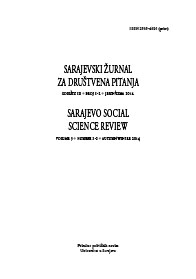Personalizacija politike u Republici Hrvatskoj: slučaj dr. Franje Tuđmana
Personalization of Politics in the Republic of Croatia:
The Case of dr. Franjo Tudjman
Author(s): Marina ŽivkovićSubject(s): Constitutional Law, Diplomatic history, Political history, Electoral systems, Transformation Period (1990 - 2010), Post-Communist Transformation
Published by: Fakultet političkih nauka - Univerzitet u Sarajevu
Keywords: personalisation of political power; presidentialism; Franjo Tudjman; Croatia;
Summary/Abstract: Although there is no consensus of academic authorities on the meaning of the concept of personalization of politics, some authors suggest that this phenomenon encompasses three dimensions: the personalization of political communication, personalization of choices and personalization of political power. The latter dimension is the subject of detailed analysis in this work, and includes politics in terms of presidency (executive, electoral competition, party organization) and the embodiment or personification of power. Applying the analysis of secondary data, the author tries to fit a ten-year government of the first Croatian president, Franjo Tudjman, into the presidential form of executive power as a trend of greater presence in Western democracies. Croatian presidentialism was primarily triggered by contingent factors - political context (war conflict and state independence followed by democratic transition) and the personality of the then dominant political actor, and therefore partially matching a Western form of the politics in terms of presidency. Tudjman’s governing was marked by: a high degree of centralization and coordination of policy-processes; frequent tendency for government reorganization; influential president’s advisory bodies which were systematically formed to bypass government and bureaucracy. Furthermore, personal authoritarian style of the governing created a cult of personality around the charismatic president who is largely (though not entirely) concentrating the power in his hands in terms of controlling the political system, as well as the social fields. The study suggests that the government of the first Croatian president represents a combination of presidentialism politics (a contingent presidentialism of executive) and personification of the power embodied in the president.
Journal: Sarajevski žurnal za društvena pitanja
- Issue Year: III/2014
- Issue No: 1-2
- Page Range: 145-164
- Page Count: 20
- Language: Bosnian

